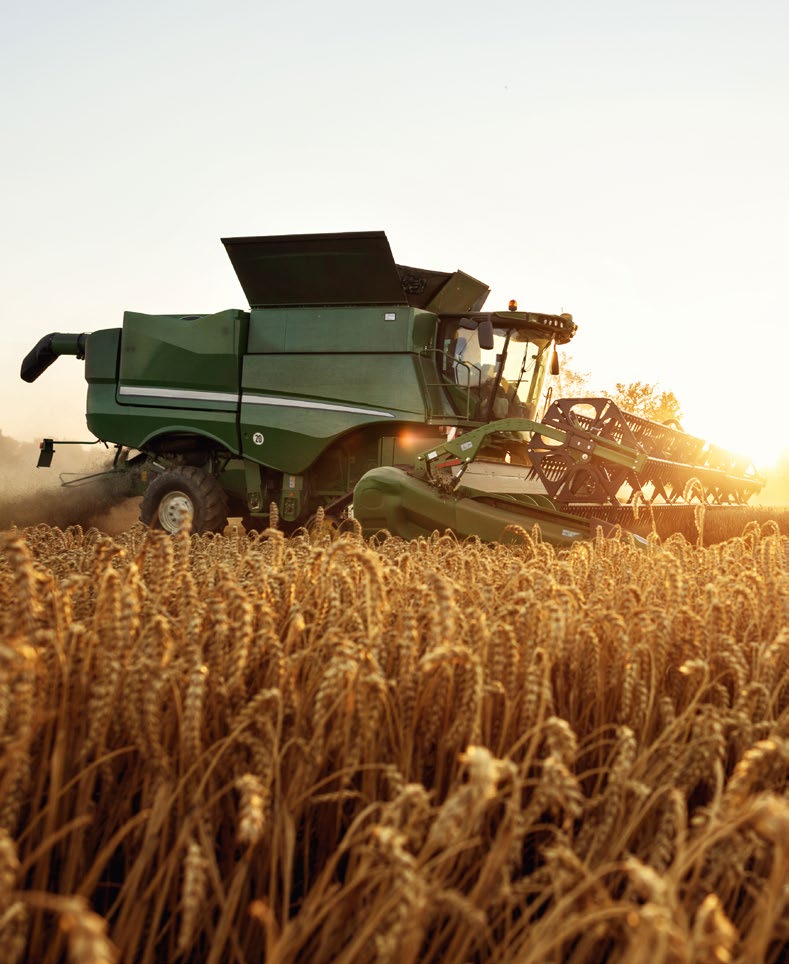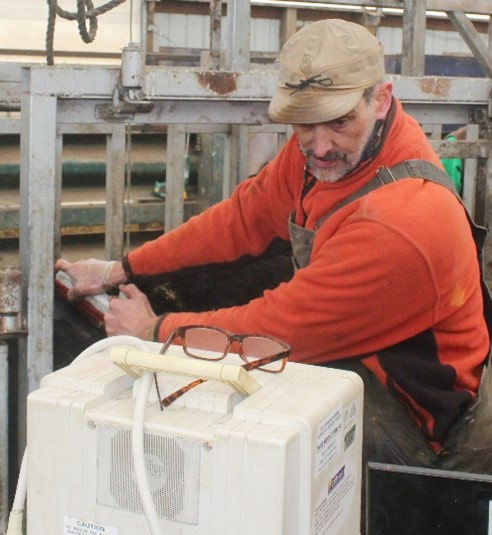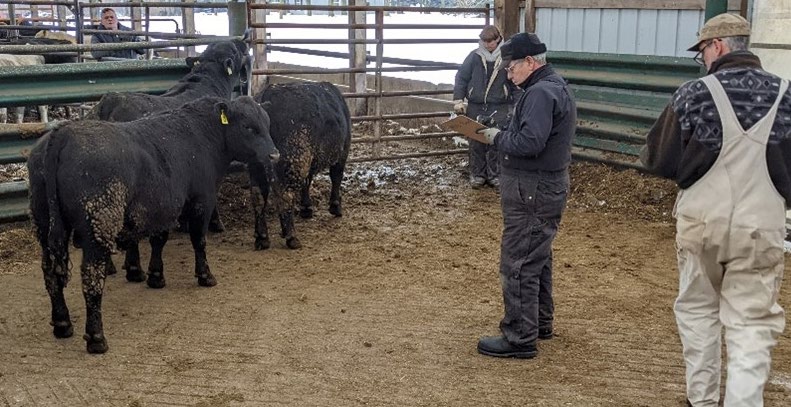
MSU Extension Provides Opportunities for Farmers to Improve Efficiencies by Focusing on Management & Production Issues
DOWNLOADMay 11, 2022 - MSU Extension
Impacts
Michigan State University Extension continues to provide valuable services, programs and information for Michigan communities and families. MSU Extension agriculture and agribusiness educators serve the agriculture industry by engaging in research, education and outreach that enhances the quality of life for their residents throughout the state by engaging people where they are in their homes, classrooms, farms and businesses. This includes providing resources and information in areas that directly influence management and production issues and decisions for those involved in these industries.
- 300,000 people accessed MSU Extension resources pertaining to management and production.
- 9,000 participants accessed educational programs focused on animal agriculture offered by MSU Extension.
- Over 47,000 livestock and crop farms are in Michigan.¹
- $104.7 billion on an annual basis is the contribution from Michigan's food and agriculture industry.¹
- $5.13 billion is the economic impact of the animal agriculture industry in Michigan.¹
- 805,000 jobs related to the food and animal agriculture industry in Michigan.¹
- MSU Extension works to increase farmer success while protecting the environment, ensuring food safety, reaching new markets and advancing agriculture through applied research.
- MSU Extension serves the animal agriculture industry by engaging in research, education and outreach that enhances the quality of life for residents throughout the state.
- MSU Extension’s agriculture production efforts strive to engage those in the industry to improve management and production knowledge, which will in turn enhance animal care, food safety and food production methods.
FOR MORE INFORMATION:
Beth Ferry, MSU Extension pork educator,
269-876-2745, franzeli@msu.edu
Sarah Fronczak, MSU Extension
environmental management educator,
517-439-9301, froncza3@msu.edu
Charles Gould, MSU Extension bioenergy educator,
616-834-2812, gouldm@msu.edu
MSU Extension Provides Relevant Information with MI Ag Ideas to Grow with Virtual Conference

In 2021, MSU Extension educators learned how to pivot their efforts to meet the needs of clientele experiencing life changes because of the COVID-19 pandemic. Traditional educational and programming efforts were shifted to methods to provide clientele with access to resources and information from their homes or office. In doing so, MSU Extension educators were able to meet the clientele where they were by providing multiple avenues to access important, relevant information for farmers, hobbyists and homeowners.
The MI Ag Ideas to Grow With virtual conference was specifically designed to meet the need for this shift in programming. The unique event combined the formerly traditional, mostly in-person, MSU Extension events Ag Action Day, Branch County Farmers Day and Southwest Michigan Horticulture Days into one cumulative, weeklong virtual program encompassing many aspects of the agricultural industry. The MI Ag Ideas to Grow With conference featured a variety of educational tracks focused on livestock production, fruit and vegetable production, sustainability, soil health and irrigation, in addition to horticulture and home gardening. A track targeted youth participants as well. This robust offering of educational programs focused on providing complete accessibility to information for MSU Extension clientele while also opening the door to new audiences.
47 |
Michigan counties had people who accessed MI Ag Ideas to Grow With virtual program. |
Over980 |
sessions were viewed by participants during the weeklong event. |
Though the program was developed out of a desire to provide virtual access to information and education typically delivered at MSU Extension’s in-person programming, the success of the virtual platform exceeded the expectations of the planning team. One of the highlights of MI Ag Ideas to Grow With was the ability to extend the reach of our traditional programming by making these educational sessions available online for those not able to travel to our usual meeting locations. During the weeklong event, participants from 47 Michigan counties attended over 980 sessions.
Surveys of program participants also indicated 67% of the attendees of the first MI Ag Ideas to Grow With virtual conference were new to MSU Extension programming, which in turn expanded the reach of Extension into more communities and homes in Michigan.
One of the goals of the virtual conference was to offer an array of educational programming that met the needs of different sectors of the agriculture industry. Throughout the week, 55 different education sessions were planned and offered, meeting the needs of all types of farmers who participate in various agriculture sectors, including hobbyists and homeowners.
This format was beneficial to participants, one of which indicated, “I’m only a backyard farmer, and I know these events are geared toward commercial farmers, but I really like attending these events and learning new things that I can apply to my farm.”
The MI Ag Ideas to Grow With virtual conference was created through a collaboration of teams from MSU Extension, representing the areas of agriculture and agriculture business; children, youth and family; and community food and environment. The common goal of these combined teams was to provide quality educational information using a virtual platform to clientele across Michigan.
"I am a student at Michigan Tech who is interested in soil science. I was browsing upcoming events on the . . . website and saw you have several events that I was interested in. I was excited to be able to attend virtually because I currently live in Houghton, which is about 8 hours away from East Lansing, and wouldn’t be able to attend in person." -Program participant
This goal was accomplished by the planning team and presenters, and verified by participants with comments such as, “Thank you so much for putting on this conference. I’ve attended the past few years and I always learn a lot. You guys do a really good job of providing various quality materials and knowledgeable speakers.”
With the overwhelming success of the first MI Ag Ideas to Grow With virtual conference, MSU Extension hosted the virtual conference again as a featured event during MSU’s Agriculture and Natural Resources Month in March 2022. The conference offered over 80 different virtual sessions into the homes, offices and workplaces of Michigan, again meeting people were there they are with relevant, important information accessible for all Michigan families and communities.
67% |
of program participants had not previously participated in an MSU Extension program prior to the MI Ag Ideas to Grow With virtual event |

MSU Feedlot Educational Series Delivers Important Management & Production Information to Cattle Producers
Educating feedlot producers in Michigan’s Thumb area has always been a priority for the MSU Extension beef team. This program had a long history of successful in-person events that left the MSU Extension beef team struggling with how to provide information to this important audience during the COVID-19 pandemic. To address this problem, the MSU Feedlot Educational Series was created, offering a virtual, monthly evening presentation every second Wednesday from December through April. This time of year presented the greatest chance for cattle feeders to find time to watch the presentations.
The MSU Feedlot Educational Series focused on providing important management information to producers in a virtual setting, which expanded the reach of this program to areas of Michigan outside the traditional Thumb location and even to national and international regions. Production topics highlighted during this series included implementing a “beef x dairy cattle” crossbreeding strategy for dairy producers and the subsequent feedlot performance of those cattle for the cattle feeder. Other topics included tips for successfully raising young dairy calves, financial recordkeeping for feedlot operations and alternative protein sources for expensive dry distillers’ grain, and the effects of different feedlot facility designs on feedlot cattle performance. Each of the presentations were recorded so that interested producers could view them later. This effort received praise from several clients that provided feedback via email regarding the accessibility of the recorded sessions.

100% |
of survey results indicated that the audience's knowledge of financial and economic analysis increased. |
The series provided valuable, impactful information to cattle feeders. Attendance during the series demonstrated rapid growth with the program continuously expanding in the number of participants in attendance.
$17-$50 |
of value was added to each animal through producers implementing the information shared during the MSU Extension Feedlot Series |
66% |
of respondents indicated that they increased their knowledge because of attending the Feedlot Educational Series. |
MSU Extension Offers Milker Training Programs that Address Cultural Barriers
With over 434,000 dairy cows² and 1,200 dairy farms in Michigan,³ dairy is the number one agricultural commodity in the state and has significant economic impact on communities across the state. Dairy farmers work tirelessly to meet the needs of their industry, giving consumers access to safe, healthy, wholesome dairy products. To do this, those involved in the industry must be focused on quality control and producing superior products.

Managing a dairy farm and producing dairy products has many challenges, including obtaining access to a competent and trained workforce. The trend in the industry has moved toward a bilingual workforce, with 20% of farm workers identifying as Hispanics who speak English as a second language. This presents several communication barriers between owner-operators, management teams and farm laborers. Knowing that obtaining access to labor and providing structured farm-training opportunities for employees was one of the industry’s biggest challenges, the MSU Extension dairy team focused their efforts on these issues.
The MSU Extension dairy team identified the lack of structured trainings for entry level employees, lack of tailored trainings or resources for individual farms, and the reduced options for Hispanic workers in Michigan as primary issues to address in 2021 for the dairy industry. Team members crafted individualized training opportunities for dairy farms that focused on building employee engagement and increasing the skills farm employees had, using resources and information available in both English and Spanish.
These efforts resulted in multiple training opportunities for dairy farm employees tailored to their individual farms. These trainings addressed the multi-cultural workforce present in Michigan’s dairy industry by providing safe, culturally inclusive trainings that reinforced good milking practices and delivered knowledge in theory and in a hands-on approach to ensure milkers perform their job optimally. These trainings are often coupled with a parlor visit to evaluate and identify specific farm needs.
"The Milker Training Program that I participated in really expanded my view of my work as a milker." -Program participant
98% |
of participants increased their knowledge regarding milking procedures |
98% |
of participants increased their knowledge regarding their impact in milk quality. |
95% |
of participants increased their knowledge about somatic cells and their meaning. |
93% |
of participants improved their skills to perform optimal milking procedures. |
90% |
of participants planned to make changes or improvements on their job performance. |
Post-program surveys reinforced the value and effectiveness of this program. Program participants who completed the survey indicated that 98% of the participants increased their knowledge of their role in the dairy industry, 95% improved their skills and 90% intended to use the information they learned to improve the way they perform their job. This program and others like it will continue to provide the dairy industry with access to relevant, important information geared toward moving the industry down the path of improvement and sustainability.
"He [farm owner] was very pleased with your training and plans to expand the training program to other farms in the operation." -Field representative from MMPA
100% |
of participants agreed that the milker training program increased their knowledge regarding milking practices and their influence on milk quality. |
88% |
of participants plan to incorporate changes to their routine because of MSU Extension's educational efforts |
20,295 Cows |
were impacted through the Milker Trainings for Dairy Operations |
20 Sessions |
were scheduled throughout the state. |
Michigan's Premier Bull Appraisal Program Provides Farmers Access to Information to Assist with Making Management Decisions
The Michigan Cattlemen’s Association and MSU’s Bull Evaluation Program (BEP) is the region’s premier central bull appraisal program. In its 34th year, the program is a cooperative effort among the Michigan Cattlemen’s Association, MSU and host Plank Farm. The objectives of the program are to a) promote performance-evaluated beef cattle and serve as an educational tool to acquaint producers with its overall value; b) provide a common environment for evaluating young bulls for rate of gain, soundness and body composition; and c) aid beef producers in obtaining superior bulls that have been evaluated for growth, breeding and structural soundness, and carcass merit.

MSU Extension educators and specialists have worked to evaluate the performance and economic data from the 10 years of bulls purchased by participants using BEP between 2010 and 2020. A total of 587 bulls were sold during that timeframe. The current survey reveals that buyers own 1.6 bulls on average purchased from the BEP and they typically use the bull for three years. The BEP bulls were documented as having offspring with greater weights at weaning and yearling, and as finished cattle. Replacement heifers sired by BEP bulls were worth more than those not sired by BEP bulls. Over the 10-year span, BEP bull offspring were estimated to be worth over $5 million more than average bulls, and BEP-supplied genetic information has an estimated worth of more than $400,000. If the BEP did not exist, producers would have incurred more than $250,000 in additional costs in obtaining breeding bulls.
$5,357 |
of additional value is credited to bulls that have completed the MSU Bull Evaluation Program (BEP). |
$5,172,575 |
is the attributed value of the BEP over 10 years. |
$79,730 |
is the worth estimated to buyers during the survey period, and $431,733 over 10 years of testing, data and resulting information provided on the bulls sold in the BEP sales. |
$1,000,000 |
Over $1,000,000 annually is the cumulative impact of the program when factoring in market value of calves produced from bulls sold. |

MSU Extension continuously provides methods for the beef cattle industry to make improvements in production efficiencies and genetics. These efforts will continue to increase the profitably of beef cattle herds in Michigan and provide a consistent evaluation system for herd bulls in beef cattle operations. Through the efforts of the cattle industry and the work of MSU Extension, Michigan will continue to lead the way in developing superior genetics and evidence-based management decisions for the entire industry.
$280 |
An additional $280 is the amount buyers estimated they would need to spend to locate and purchase a bull of similar quality if the BEP did not exist in Michigan, survey results indicate. |
$265,826 |
$265,826 over 10 years is the amount producers additionally saved procuring their breeding bulls through the existence of this program. |
Resources
1 Michigan. gov. (n.d.). Facts about Michigan agriculture. https://www.michigan.gov/mdard/about/mi-agriculture/ michigan-agriculture-resources
2 U.S. Department of Agriculture. (2022, February 1.) Michigan cattle inventory news release (NR-22-08). https://www.nass.usda.gov/Statistics_by_State/Michigan/ Publications/Current_News_Release/2022/nr2208mi.pdf
3 United Dairy Industry of Michigan. (n.d.). Michigan dairy facts. https://www.milkmeansmore.org/milk-local/ michigan-dairy-facts



 Print
Print Email
Email


